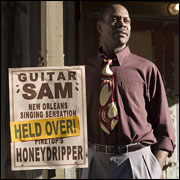Interview: John Sayles of “Honeydripper”
Posted on January 21, 2008 at 8:00 am
 Writer-director-editor-actor John Sayles has made some of the most consistently literate, subtle, and engaging films of the last three decades, including The Secret of Roan Inish
Writer-director-editor-actor John Sayles has made some of the most consistently literate, subtle, and engaging films of the last three decades, including The Secret of Roan Inish, Lone Star
, Casa de los Babys
, Passion Fish
, and Eight Men Out
. I spoke to him about his new movie, “Honeydripper,” the story of Tyrone (Danny Glover), who has a bar in 1950 Harmony, Alabama. His only hope for keeping it going is an appearance by recording star Guitar Sam. When Sam does not show up, Tyrone substitutes a young performer named Sonny, counting on the fact that no one in Harmony has any idea what Guitar Sam looks like.
Would you say there is one theme in your movies, one idea that you like to explore?
The ones that are set in the US, a lot of them are about that tension between the American dream, what we think of as our ideal, and the reality. I like to show people who think they have nothing to do with each other listening to each other. Music is the way people pay attention to each other first, listening to and borrowing from each other’s music, before they are willing to share ideas.
Your last few films have been contemporary. What is different about doing a film set in another time?
Period films are more fun for the art dept. They read a lot of books and look at a lot of pictures, looking at cars, guitars, everything that appears in the film. I am thinking through the characters, how did they think back then, what did they accept, what did they question. This takes place in 1950, before the media started calling it the Civil Rights Movement. Southern towns were not on the alert yet that there was going to be a movement. They were still saying, “We thought all our colored people were happy.” You have to get yourself back into that head. I read autobiographies and biographies, to just get the vibe of the time. It’s within my lifetime, but we’re talking to people who are younger. Our audience is adults who were born years after Martin Luther King was assassinated. He’s somebody on the history channel to them and they do not have that personal experience of how radical he was.
For me the heaviest line in the movie is when the sheriff says “Take your hat off,” not because he’s the sheriff, it’s not a question of his legal authority. It is just because he is white. Unlearning what we know, every character you have to kind of work that equation in. The political activist in the film is the Pullman porter . They were the guys who got around and delivered the message. They had the most radical union. That was the era of A. Philip Randolph.
Was the character of “Guitar Sam” based on anyone?
That was an era before rock videos. They didn’t even have album covers. There was no TV yet, and radio was basically local. The one big regional show they listened to was the Grand Old Oprey. So even fans did not know what the performers looked like. Guitar Slim was famous for not showing up, and many perfomers, people who became icons of R&B guitar, were told “Tonight you’re Guitar Slim.” And if you could play people didn’t care that much. People who were not well known got a chance to perform. Ray Charles went around as Charles Brown.
How did you find the performer who plays Sonny, the young musician who electrifies the audience?
We thought we were going to have to do a nationwide search. But Lewis Black, one of the founders of South by Southwest, said, “There’s a kid here who may be too young for you but I’ve been hearing him play guitar since he was 14.” That was Gary Clark Jr., We went to hear him play and read him at a friend’s house and said, “Oh, he can act, too!” I told him, “Don’t worry about the acting too much but work on jumping up on tables and chairs.” He looks kind of like a young Chuck Berry, got that “brown-eyed handsome man” thing going for him. Now he is working on his own album and has regular gigs in Austin. 
How did you mesh the very experienced actors in the cast with the first-time performers?
You count on them being generous actors. Fifteen of the speaking parts are people from the area, so they have the accent already. A lot of it is getting them comfortable in front of the camera. I give the actors something else to do so that the lines are the third thing in their head, and usually they are playing something close to what they really are. Keb’ Mo’ gets to play the guitar while he talks. Danny Glover and Charles S. Dutton work hard with those actors and help to bring out the character. Danny was kind of gruff and like a father-in-law even off-screen and Charles was more jokey. That got Gary into the relationships.
Why did you cast yourself in the film? Isn’t writing, directing, and editing enough?
I was an actor before writing and directng and I like acting. And it’s convenient. There I am; I don’t have to fly myself there. The scene I’m in is a minute long. The character has to make a quick impression and has to be a little bit intimidating. I’m 6’4″ and Danny’s 6’3″ so I’m the only one taller than Danny is. The hardest thing about that role was keeping that truck going. It did not want to be cooperative.
What inspired you to make films?
Growing up I saw mainstream American movies. I didn’t know there was such a thing as a director until I was 18 except for Hitchcock who did cameos. Then I saw a combination of a bunch of Italian neo-realist movies and the earliest of the American independents, John Cassavetes, Melvin Van Peebles, and others and first got the idea that you could just make a movie and tell your story.
How have people been responding to the film?
You just get hooked into the characters and want to know what happens next. Once Tyrone starts building a house of cards anything could knock it over. It’s a personal drama that speaks to the bigger isssues as well.
The issue of race has always been American history, going back to the Continental Congress. The Constitution had words very carefully chosen to make sure all colonies were included. There has always been that compromise between what is just and right and what the populace can stand at that moment. That’s where a lot of the drama in our movies comes from, that tension. And music is ahead of talk in raising those issues and making those connections.
